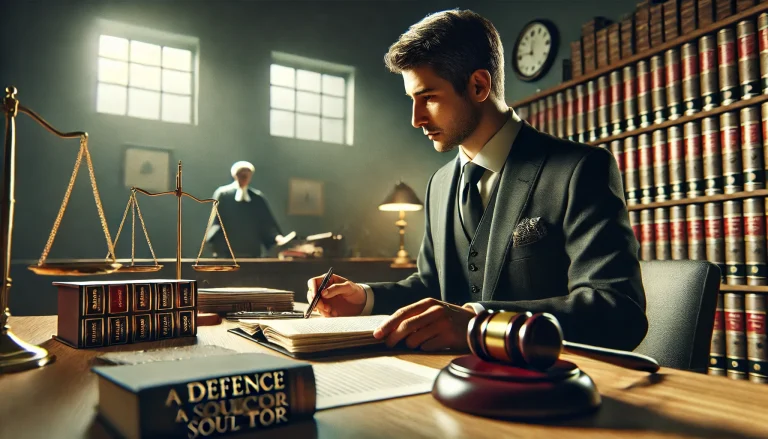When faced with allegations of a serious crime, the importance of a defence solicitor cannot be overstated and could even end up being your only defence against criminal charges. These legal professionals play a critical role in navigating the complexities of the criminal justice system and ensuring that the rights of the accused are upheld.
Understanding the integral part a defence solicitor plays can highlight why securing experienced legal representation is crucial. Let’s delve in…
The Role and Responsibilities of a Defence Solicitor
Defence solicitors are responsible for providing legal advice and representation to individuals accused of crimes. Their responsibilities are broad and encompass various stages of the legal process. Some of the key duties include:
Legal Advice and Consultation
From the moment an individual is accused of a crime, a defence solicitor provides essential legal advice. They ensure that their client understands the charges against them, the possible consequences, and the legal options available. This initial consultation is crucial for laying the groundwork for the defence strategy.
Representation in Court
A significant part of a defence solicitor’s role is to represent their client in court. This involves preparing and presenting a strong defence, cross-examining witnesses, and challenging the prosecution’s evidence. Effective representation can significantly impact the outcome of the case.
Negotiation and Plea Bargains
In some cases, a defence solicitor may negotiate with the prosecution to reach a plea bargain. This can result in reduced charges or a lighter sentence for the accused. Skilled negotiation requires in-depth knowledge of the law and an understanding of the case specifics.
The Impact of Legal Representation on Criminal Cases
Having skilled legal representation can profoundly influence the trajectory of a criminal case. Here are a few ways in which a defence solicitor can make a difference:
Ensuring Fair Treatment
One of the primary roles of a defence solicitor is to ensure that their client receives fair treatment within the criminal justice system. This includes protecting their client’s rights during police interviews and ensuring that any evidence presented in court is obtained legally.
Building a Strong Defence
A defence solicitor meticulously reviews the case details, gathers evidence, and consults with experts to build a robust defence. Their thorough preparation can uncover inconsistencies in the prosecution’s case or highlight mitigating circumstances that can influence the verdict.
Providing Reassurance and Support
Facing criminal charges can be an incredibly stressful experience. A defence solicitor not only provides legal expertise but also emotional support and reassurance. Knowing that a dedicated professional is handling their case can significantly reduce the anxiety experienced by the accused.
Detailed Examination of Evidence
A defence solicitor plays a vital role in scrutinising the evidence that the prosecution presents. This includes:
- Examining forensic reports
- Reviewing witness statements
- Ensuring that all evidence was collected and handled in accordance with legal standards
By thoroughly investigating the evidence, a defence solicitor can identify any inconsistencies or procedural errors that might weaken the prosecution’s case.
Expert Witnesses
In some cases, defence solicitors may call upon expert witnesses to provide specialised knowledge that can support the defence. These experts might include forensic scientists, medical professionals, or other specialists whose testimony can challenge the prosecution’s evidence. The defence solicitor’s ability to find and effectively utilise these experts can be a game-changer in the courtroom.
Cross-Examination
Effective cross-examination is a critical skill for any defence solicitor. By questioning the prosecution’s witnesses, a solicitor can expose flaws in their testimony, cast doubt on their reliability, and ultimately strengthen the defence’s position. This process requires strategic thinking, a deep understanding of the case, and the ability to remain composed under pressure.
Legal Representation in Different Types of Criminal Cases
The role of a defence solicitor can vary significantly depending on the nature of the criminal charges. Here are a few examples:
Minor Offences
For minor offences, such as petty theft or minor drug charges, a defence solicitor might focus on negotiating a favourable plea bargain or seeking alternative sentencing options, such as community service or rehabilitation programmes.
Serious Crimes
In cases involving serious crimes, such as assault, robbery, or murder, the stakes are much higher. A defence solicitor will need to develop a comprehensive defence strategy, which may involve extensive investigation, collaboration with experts, and rigorous courtroom advocacy. Their expertise can be the determining factor in securing an acquittal or a reduced sentence.
Ethical and Professional Standards
Defence solicitors are bound by a strict code of ethics and professional standards. This includes maintaining client confidentiality, providing honest and independent legal advice, and acting in the best interests of their clients. These ethical obligations ensure that the accused receives competent and diligent representation, regardless of the nature of their alleged crime.
The importance of adhering to these standards is highlighted in various reports, including an Amnesty International report on the treatment of detainees. Such guidelines are crucial in maintaining the integrity of the legal profession and ensuring that justice is served.
How Legal Representation Can Impact Criminal Cases…
In conclusion, the role of a defence solicitor is crucial in ensuring that justice is served and the rights of the accused are protected. By providing expert legal advice, representing clients in court, and negotiating plea bargains, defence solicitors can significantly impact the outcome of criminal cases.

